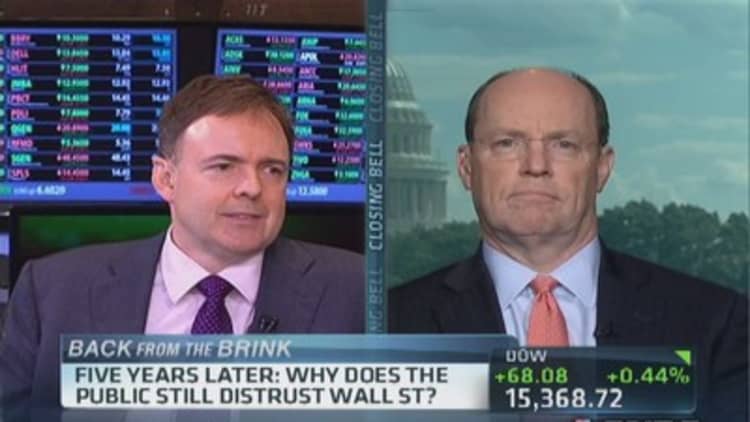Bob Diamond – the former head of Barclays who tried to buy Lehman Brothers before its collapse five years ago – has joined a chorus of criticism over the lack of progress in ending banks' "too big to fail" status.
Citing "insufficient" progress in ways to safely wind down failing financial giants, Mr Diamond has called for fresh international co-ordination to end the fragmenting approach to bank regulation.
Writing in the Financial Times, the former banking boss expresses an apparent change of heart about the risks that Barclays and other banks were taking in the years before the crisis, by admitting that leverage was "too high in the boom years". He says that various regulatory advances have helped cut risk in the system but warns: "A global framework is required if we are to avoid the kind of capital regulatory arbitrage that weakened the financial system."
(Read more: Fed meeting will top all events in Asia this week)
Mr Diamond's comments – a rare public outing since his ejection from Barclays by regulators a year ago – reflect broader concerns among investors and officials that government powers to deal with the failure of the largest financial institutions are still inadequate.

Sheila Bair, who as chairman of the Federal Deposit Insurance Corporation fought the financial crisis and was an architect of the new "orderly liquidation authority" designed to deal with a future Lehman, acknowledged that the market did not find the tool credible and blamed the Federal Reserve for not convincing the world that it would be used.
"I think it does matter because you don't really get rid of 'too big to fail' unless you convince the market it's over with," she said. "The Fed has been tremendously co-operative at working on this but it would be nice to hear them say publicly, 'It's over guys, it is going to work. You invest in these banks, you buy their debt, but do your homework because you're going to take a loss when they go under.' "
Such a workable tool is a long way off, according to Jim Millstein, a former Lazard banker who led the US Treasury's restructuring of AIG, the insurance group that the government, unlike Lehman, did save with $180 billion of taxpayer funds.
(Read more: Shadow Banking Facing Tougher Regulations)
He said it would take "10 to 15 years" to untangle the complex web of inter-company guarantees at the largest financial institutions to make it possible for officials to seize a company and wind it down without a failure or taxpayer bailout.
The largest financial groups would need "a significant cushion of long-term unsecured debt . . . to absorb future losses of the magnitude experienced in the crisis," he said. "Otherwise taxpayers will be at risk again."
Paul Singer, founder of hedge fund Elliott Management, said: "When a 'systemically important' firm is in distress, creditors and counterparties will likely rush for the exits, fearing the multiple layers of uncertainty embedded in the OLA process."
More from the Financial Times:
Lehman aftermath yields $3 billion payday
Global banks in talks to set up joint checks on customers
Central banks struggle to communicate
Ken Griffin, head of Citadel, the hedge fund, also expressed concern that the government would choose to support some creditors but not others. "Any creditor not on the government's 'favored nation' status is going to flee from a bank at the first sign of trouble, accelerating a downward spiral."
The Fed and global regulators are planning to require the largest financial groups to carry a minimum amount of long-term debt that could be converted to equity to recapitalize a failing institution without taxpayer funds.
In the US, the FDIC requires "living wills" for companies to explain their network of debt relationships between different entities and could require changes, or even break-ups, if officials decide that they are too entangled to be credibly separated during a crisis.
(Read more: Regulations could make insurers flee UK: Analyst)
EU plans have been mired in controversy, with Germany in particular opposed to the creation of a central eurozone authority that would shut down failing banks.
Other progress has been more encouraging, particularly the liaison between the Bank of England and the US authorities. But some policy makers seem to be flagging after an unremitting five-year reform agenda.
Mark Carney, the new governor of the Bank of England, and chairman of another global regulator, the Financial Stability Board, wrote in the Financial Times last week that fellow policy makers "must keep going". He said laws were vital not just to wind up banks in a crisis but "to make all systemically important companies resolvable: banks, shadow banks, insurance companies and market infrastructure".

